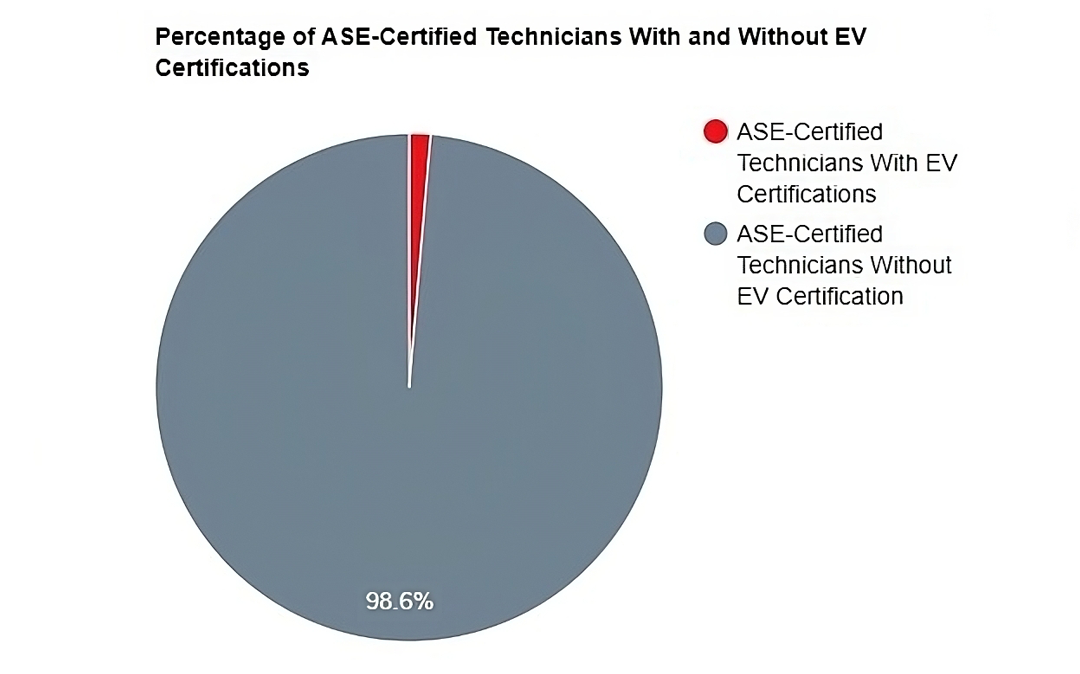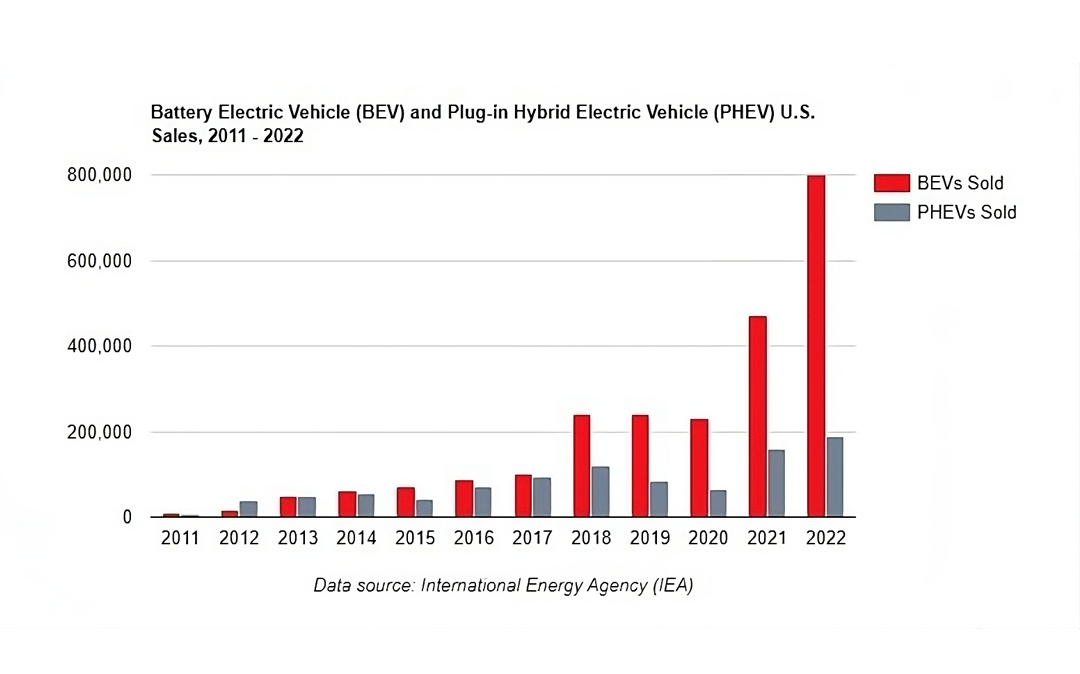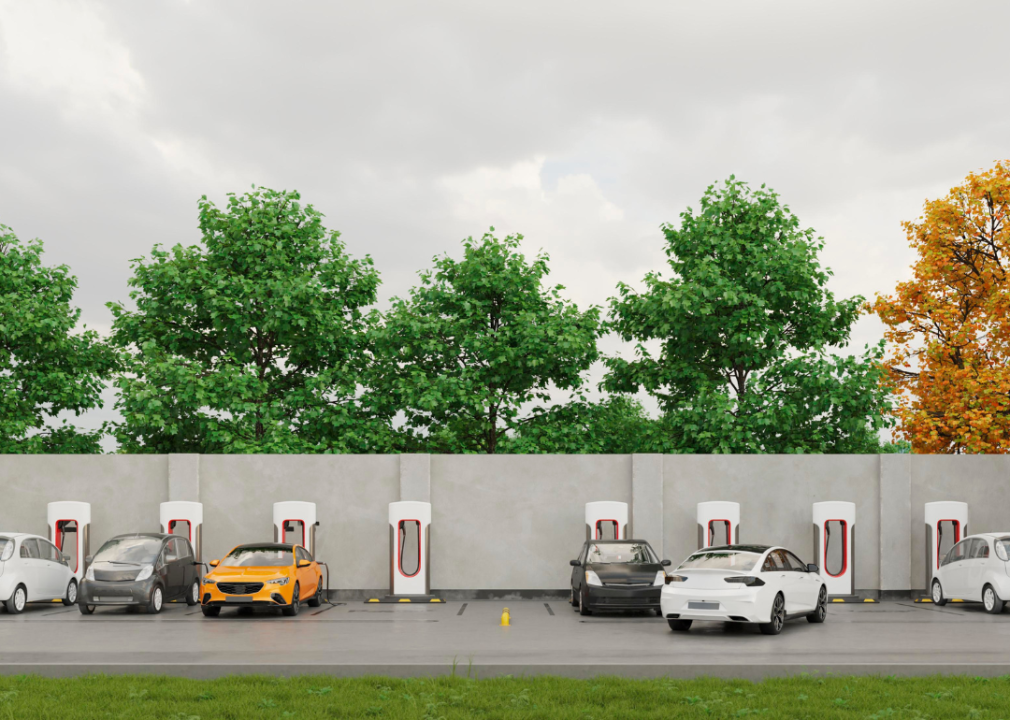Are we about to face an EV technician shortage?

Canva
Are we about to face an EV technician shortage?
An automotive technician inspecting a vehicle’s tires
Electric vehicles (EVs) have seen a massive surge in popularity and market share in recent years, in a trend that is only likely to accelerate in the near future. Forecasters are predicting that millions more EVs will hit American roads in the next few years, and the federal government is providing tax incentives and other subsidies to help make that a reality.
However, the rapid influx of EVs presents several potential problems. One of those is whether or not the automotive repair industry will have enough technicians trained to work on EVs. Such a skill gap could leave owners with few options for maintenance and repairs and add an additional layer of difficulty and inconvenience to EV ownership.
Automoblog dives into the question of whether the growth of the electric vehicle market is leading to a technician shortage and what effect that could have on the automotive industry.
![]()

Automoblog
Few technicians are certified to work on EVs
A pie chart showing Percentage of ASE-Certified Technicians With and Without EV Certifications
According to the U.S. Bureau of Labor Statistics, there are 782,200 people employed as automotive service technicians and mechanics as of 2022. Of those, around 222,000 are certified by the National Institute for Automotive Service Excellence (ASE), according to the organization. But only 3,400 of those – around 1.5% – have EV-specific certifications.
Blake Ellis, owner at Northgate Automotive in Durham, North Carolina, told Automoblog that there are substantial differences between working on internal combustion engine (ICE) vehicles and their EV counterparts.
“The entire process is different,” he said. “Things as simple as just lifting the vehicle have become more challenging because the battery placement is typically the entire undercarriage of the vehicle and vehicles like Tesla require special plates to even be able to lift the vehicle. When you start to look at EV systems, you have different cooling systems to keep the batteries cool. You have high voltage systems, which can lead to severe injury or death if not properly handled.”
Ellis said that even parts that are not specific to EVs can require different tools and techniques to repair or replace.
“The design of EVs starts to impact the effort and ability to even repair standard mechanical items on the car, such as its brakes and suspension,” he said. “This is because if these components sit behind or around any EV component it becomes a much different repair. Even tire services have become different because a lot of these tires have foam lining the inside to help cut down on road noise.

Automoblog
EV sales are growing quickly
A graph showing Battery Electric Vehicle (BEV) and Plug-in Hybrid Electric Vehicle (PHEV) U.S. sales 2011-2022
Up to now, a relative lack of certified technicians hasn’t been a significant issue for EV owners or the shops that service them. Despite a massive increase in EV sales in recent years, battery-powered vehicles still only make up around 1% of vehicles in use.
Ellis says his shop has yet to see significant demand for EV-specific services, but has seen more requests for plug-in hybrid electric vehicle (PHEV) repairs.
“We still generally tend to see the same common issues with some of the hybrid vehicles,” he said. “Those are mainly hybrid battery requests for things like Toyota Prius, but nothing specific to EVs. Although, this would be expected considering how relatively new these still are to the industry.”
Demand for EV technicians is likely to swell soon and significantly, however. The number of EVs sold in the U.S. has increased dramatically in recent years. According to the International Energy Agency (IEA), there were roughly 800,000 battery-powered electric vehicles (BEVs) sold in the U.S. in 2022, compared to around 470,000 in 2021.
This trend is predicted to continue or even accelerate in the coming years. The IEA estimates that roughly 2.9 million BEVs will be sold in the U.S. in 2025. This would be a 262.5% increase from 2022 if the prediction holds true.
In 2021, President Joe Biden set a goal of EVs accounting for 50% or more of total vehicle sales by 2030. A report from Reuters estimates that if the automotive industry reaches that goal, EVs would account for 60% to 70% of all vehicles on the road by 2050. While that is still more than a quarter-century away, EVs will undoubtedly make up a much more substantial portion of vehicles on the road in the very near future.

Canva
A large number of EVs are starting to age
A row of EVs charging at charge stations
In addition to the comparatively low number of EVs on the road up to this point, another reason there has yet to be a huge need for EV techs is that most EVs on the road are still relatively new. Newer vehicles – whether ICE-powered or EVs – are much less likely to need mechanical repairs or major maintenance services than older vehicles.
Ellis pointed out that many of these vehicles are still new enough to still fall under their factory warranty. In most cases, these warranties require vehicles to be serviced at dealerships or by brand-certified technicians and not at independent repair shops like Northgate Automotive.
“If you look at manufacturers who have been in the game longer like Tesla, they require Tesla-certified facilities for repairs,” he said. “A lot of the new EV vehicles would still generally be under a manufacturer warranty and would go back to the dealer for any repairs.”
But that will soon start to change. Over the next few years, hundreds of thousands of EVs will approach the 10-year mark, taking them out of warranty protection and into an age and mileage in which repairs will be more common. That number will only increase in the years that follow.

Canva
Technicians are getting more options for EV repair training
A technician runs diagnostics on an electric vehicle
Demand for technicians trained and certified to repair and maintain EVs is all but certain to grow in the coming years. But the opportunity for mechanics to learn those skills and become certified is already increasing. The automotive industry’s foremost training and certification organization, the National Institute for ASE, currently offers multiple certifications for EV services.
ASE Vice President of Communications Trish Serratore told Automoblog that the organization has seen an increase in demand for these courses.
“We see great interest in the EV service area,” she said. “Most vehicle manufacturers are offering training and requiring their service outlets to have the training and certifications necessary to work on EVs.”
The primary certification that ASE offers is its Light Duty Hybrid Electric Vehicle Test and Certification. This course teaches technicians how to diagnose and repair BEVs and PHEVs. Technicians are required to pass both the organization’s electrical and electronic systems test and the engine performance test to take the EV course.
In addition, ASE offers two levels of EV High-Voltage Electrical Safety certification. The first level teaches general safety practices around high-voltage batteries and electrical systems in BEVs and PHEVs for technicians working with the vehicles but not on EV-specific components. The second level is an advanced course that teaches safety skills for technicians working directly on those components.
Serratore said that safety is one of the biggest points of emphasis for ASE’s EV courses.
“The most important thing to learn and practice is safety,” said Serratore. “It is essential that technicians understand these systems and how to work on the entire vehicle safely and efficiently. Paying attention to and using personal protective equipment is paramount.”
EVs may not actually require as many technicians
While the need for more EV-certified technicians in the near future is real, that need may be partially alleviated by the very nature of EVs themselves. Many of the repairs and maintenance services that are common to ICE vehicles aren’t necessary for BEVs simply because they lack the complex mechanical engines of ICE vehicles.
In a publication on its Alternative Fuels Data Center, the U.S. Department of Energy outlined several reasons why EVs, and especially BEVs, generally require less maintenance and fewer repairs.
According to the publication, “All-electric vehicles typically require less maintenance than conventional vehicles because the battery, motor, and associated electronics require little to no regular maintenance; there are fewer fluids, such as engine oil, that require regular maintenance; brake wear is significantly reduced due to regenerative braking; [and] there are far fewer moving parts relative to a conventional fuel engine.”
A reduced need for repairs and maintenance means that, in theory, EVs require fewer service appointments on average than ICE vehicles. This could translate into an overall reduction in the labor force needed to service these vehicles. The need for EV technicians will still exist, but that need could be tempered by the improved reliability and simplicity of the vehicles.

Canva
A technician shortage could cause issues for EV owners
A mechanic holding three wrenches
Given current trends and industry predictions, the increase in EVs both in number and in the percentage of vehicles on the road seems like an inevitability. With that, so does the need for more technicians that work on them.
However, Ellis said that he believes that a corresponding need for EV-certified technicians may take a while to develop.
“I think we still have a long time before we see this as an absolute necessity,” he said. “I think the EV market still has a long way to go before they can be relied on 100%. And I think even with recent legislation pushing towards EV, we will not see a saturated market for a long time.”
Based on available data, there are currently 1,270 ICE-powered vehicles to every ASE-Certified technician that can work on them. By comparison, there are only 807 EVs for every technician with an EV-specific ASE certification.
That ratio could easily change in the near future, though. While the IEA predicts that 2.9 million BEVs will be sold in the U.S. in 2025, less than two years from now, it also estimates that that number will climb to 6.8 million in 2030.
What remains to be seen is whether the growth of EV sales will outpace the growth of people training and becoming certified in EV repairs and maintenance. The automotive repair industry as a whole is seeing a shortage of technicians, with little indicating that the situation will improve anytime soon. Ultimately, it could be a shortage of technicians as a whole and not only those certified to work on EVs that causes issues for EV owners in the future.
In the U.S., the growth of the EV market has been aided significantly by government subsidies. Federal programs have provided tax breaks to make EVs more affordable, incentives to help bolster domestic manufacturing, and funding to help spur research and development. However, no such funding has been appropriated to help train people to work on the rapidly growing number of EVs that are currently on the roads and set to hit them in the future.
This story was produced by Automoblog and reviewed and distributed by Stacker Media.